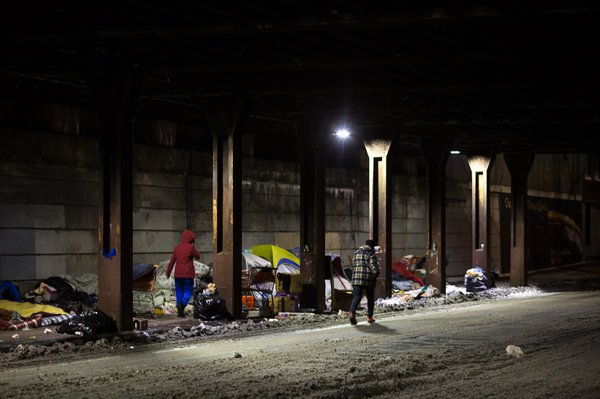A pilot program to clear two of the biggest heroin encampments in Kensington is yielding positive results at the end of its 30-day test period, city officials said at a press conference Wednesday.
The program revealed last month was part of a multi-pronged approach to addressing Philadelphia's spiraling opioid addiction crisis. Overdose deaths in the city increased by 34 percent from 2016 to 2017, fueled by the growing prevalence of the synthetic opioid fentanyl.
- RELATED ARTICLES
- 'Road Rules' alum Brian Lancaster died of accidental overdose in Phoenixville, coroner says
- Authorities seize massive amount of Chinese fentanyl on Main Line
- Opioid overdoses are rising faster among Latinos than whites or blacks. Why?
The encampment pilot plan targeted two hotspots on Tulip Street and Kensington Avenue, where as many as 200 people were estimated to be living in makeshift conditions.
“We have never seen a crisis like this before in Philadelphia and doing nothing is not an option,” said city managing director Michael DiBerardinis. “We are happy with the preliminary results. We provided respite housing for over 100 people and saw more people enter treatment in the first two weeks of the pilot than in the prior six months; however we have more work to do.”
Outreach and engagement at the encampments enabled city officials to created an initial by-name list of the people living there. These individuals were then connected with services, respite and treatment in partnership with neighborhood non-profit organizations. Many were given a place to stay at the city's new 40-bed Navigation Center or one of another 50 beds available at other nearby locations.
“This pilot plan shows that many people really do want treatment and housing," said Liz Hersh, director of the Office of Homeless Services. "When we start with what people need — and want — and are strategic in our efforts, we can make a difference.”
More than 120 people accepted services, nearly four dozen entered treatment and more than two dozen got ID cards, officials said Wednesday. Almost half of the people surveyed at the camps said lack of identification was one of the main barriers they had to leaving the encampments.
“We gave people a chance to get off the street and get the help they need by addressing barriers that are usually a deterrent, such as a lack of transportation and ID’s, as well as providing treatment on demand and low-barrier emergency housing for those who are not ready for treatment, but want to come in," Hersh said. "We are very heartened by the results.”
The pilot will now be assessed by an outside evaluator and reviewed by neighborhood associations in Kensington to help develop a plan of action for the remaining two encampments.

